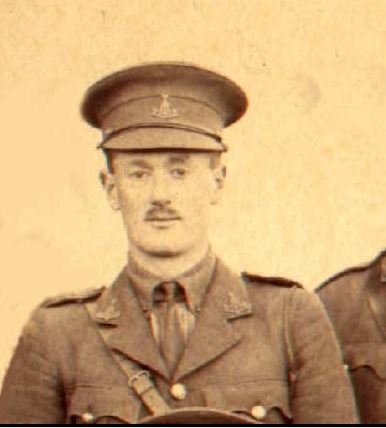
Reasearched by John Mills.
Leslie Hanson Marriage was born in Chelmsford in 1892. He was educated at Marlborough College from 1905 to 1910 and in the summer of 1910 passed into the Royal Military College Sandhurst. He left in late 1911 and was commissioned on the 20th September as a 2nd Lieutenant in the Yorkshire Regiment. He made Lieutenant on the 2nd September 1914.
He went to France with the 2nd Battalion and was wounded near Ypres on the 29th October 1914. He served with the Motor Machine Gun Corps in France from 10th August 1915 and was again wounded in March 1916. This time his wounds were described as ‘shell shock’ though the actual details are unknown. He was repatriated to England for rehabilitation. Six months later in November 1916 he was fit enough to be given command of a Home Cadet Battalion.
In November 1917 he was appointed to the Egyptian Expeditionary Force. April 1918 would see him back in France second in command of the 74th MGC taking part in the action around the Somme and Albert to the Hindenburg Line in September 1918. He was promoted to acting Lieutenant-Colonel in December 1918. He volunteered for service in Russia for which he sailed in May 1919. He was awarded the Military Cross in 1920 and retired from the Army in September 1922.
He married in 1926 and died in 1935.
Explore more memories from the ribbon
-
Nancy Bainbridge
Story submitted by Mrs Drury, a resident of Richmond. Nancy Bainbridge was born in Weardale, County Durham in May 1894. She was one of eight children whose parents were hardy hill farmers. Nancy was a very practical person and joined Queen Alexandra’s Imperial Military Nursing Service in 1914. Nancy served at a military hospital in East Anglia where the nurses received casualties straight from the Somme. Her upbringing on a farm had afforded her some preparation for the ensuing, distressing sights and sounds. She described how the men arrived with mud and tufts of grass in their wounds. The nurses found out the hard way that soldiers’ skin, subjected to the mustard gas attacks in the trenches, could not be washed with water as that inflicted pain. Nancy received many deathbed requests. After the war Nancy worked as a private nurse in families with disabled soldiers and patients with other conditions. She married Captain Jack (John Adam) Bell. Nancy had a brother William, also a hill farmer and ten years older. He joined the Northumberland Fusiliers, but saw little service because, when detailed to chop an officer some sticks, a splinter blinded him in one eye. Another sibling, Violet, worked in Barnard Castle’s recruiting office. Her soldier husband Harry Raine was awarded the Military Cross. The medal was presented to the Bowes Museum, Barnard Castle.
-
Herbert Read DSO, MC
Herbert Read served in the 2nd, 7th and 10th battalions of the Yorkshire Regiment from 1915 to 1918. During his time in service he was awarded the Military Cross for his actions in leading a trench raid, successfully securing a German prisoner for interrogation and a Distinguished Service Order for his role commanding the 2nd Battalion during the German Spring Offensive of March 1918. He published two volumes of war poetry during the conflict and is commemorated alongside Wilfred Owen and Siegfried Sassoon in Poets’ Corner in Westminster Abbey. He became a leading figure in the 20th Century, as curator at the Victoria and Albert Museum and Professor of Art at Edinburgh and Harvard Universities. He counted Picasso, Dali, Graham Greene, George Orwell, Peggy Guggenheim and Man Ray amongst his friends. A knighthood in 1953 (at the suggestion of Winston Churchill) came as a surprise to his circle of political associates. His headstone at St Gregory’s Minster near Helmsley reads ‘Knight, Poet, Anarchist’.
-
Joseph Allen
Joseph (third from left) was born around 1884 in Ainderby Steeple near Northallerton in North Yorkshire. He was the eldest of five children to Thomas and Amelia. He would eventually end up living at East Witton where he worked on the Jervaulx estate. He married Agnes Kendray and they would have three children. Joseph was a fine athlete as witnessed on Coronation Day June 22nd 1911. In the fell race to the top of Witton Fell and back Joseph came first. His exploits were published in the parish magazine. Joseph enlisted at Middleham joining the 7th Battalion Yorkshire Regiment. The Battalion embarked for France on the 13th July 1915. It was during operations in February 1917 in an area of the Somme that heavy German artillery would take a heavy toll. A shell destroyed a cellar being used to house stretcher cases killing most of the men. One of those reported missing was Private Joseph Allen. His body was never found. Joseph’s name is commemorating on the Thiepval Memorial. A service was held at East Witton Church on the 3rd March. Tragically, one month after the service, Joseph’s widow Agnes died, aged 33, leaving three young orphans.
